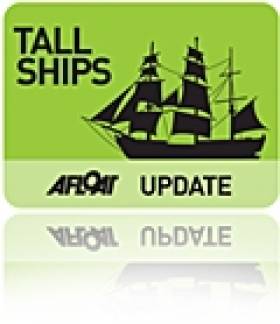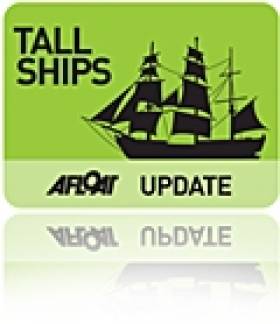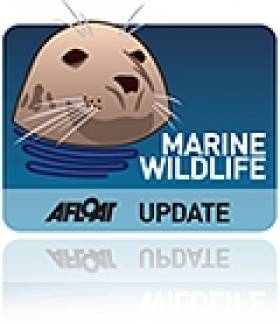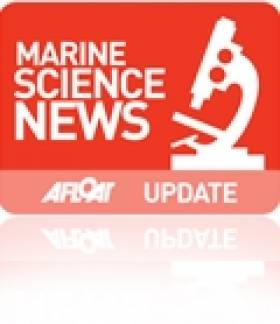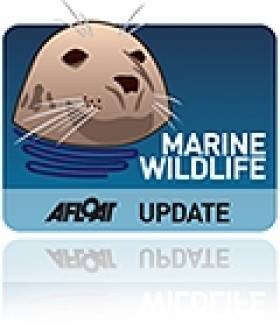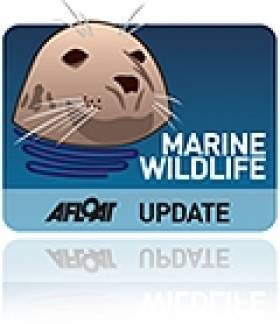Displaying items by tag: Simon Berrow
IWDG Hopes Day Trips Will Keep Celtic Mist Afloat
#TALL SHIPS - Not only has the Celtic Mist finally been lifted into dry dock for refurbishing this week, but the Irish Independent reports that day trips will be offered on the yacht when it returns to the water next summer.
As previously reported on Afloat.ie, the one-time personal yacht of the late Taoiseach Charles Haughey is being repurposed as a research vessel by new owners the Irish Whale and Dolphin Group (IWDG) at a cost of some €60,000.
In an effort to help fund the 52-foot ketch's refit bill and its estimated €20,000-per-year running costs, members of the public who pay €50 for a 'Celtic Mist Certificate' will be entitled to a day's sailing on board the newly retitled RV Celtic Mist.
IWDG co-ordinator Dr Simon Berrow said: "We've a lot of work to carry out on the yacht before we can take it out for research," IWDG co-ordinator Simon Berrow told the Independent. "We are confident that we can raise the money to run it."
Here's a link to a TV3 clip
The yacht once owned by the late former Taoiseach Charles Haughey will be only Irish entrant in the Tall Ships Races at Waterford later this month.
The Irish Times reports that Celtic Mist will take part in the first leg of the race to Greenock in Scotland before it is fitted out for its new life as a research vessel for the Irish Whale and Dolphin Group.
The IWDG's Simon Berrow confirmed that it has accepted the Haughey family's offer of the yacht as a gift to support its study and conservation of whales, dolphins and porpoise in Irish waters.
He said the group first had to explore the feasibility of running such a large vessel before it could accept the "very generous offer".
The Irish Times has more on the story HERE.
Fears for Pilot Whale Pod Headed for Ireland
The Irish Whale and Dolphin Group (IWDG) is on alert as a pod of pilot whales that narrowly avoided a mass stranding in Scotland heads south towards Ireland.
The situation has prompted fears of a repeat of last year's tragic beaching of 33 whales on an island off the Donegal coast.
Simon Berrow of the IWDG told The Guardian: "We're on standby to see if the pilot whales come to Ireland, and we're getting regular updates from our colleagues in the UK. So we're watching and waiting."
The Guardian has more on the story HERE.
Celtic Mist Offered as Gift to IWDG
The yacht sailed by late former Taoiseach Charles Haughey has been offered as gift to the Irish Whale and Dolphin Group (IWDG) as a research vessel.
The Irish Times reports that 52ft Celtic Mist had been on sale in the Isle of Wight for €175,000 since last year, but with the market at a low ebb, son Conor Haughey invited the IWDG to take over the vessel, subject to negotation.
The IWDG's Simon Berrow said the group's membership showed "overwhelming support" for the gift, and is currently looking into sponsorship to support the yacht for research, as maintenance costs would run around €20,000 per year.
The Celtic Mist was once the subject of some controversy when it emerged during the Moriarty Tribunal that businessman Dermot Desmond had paid refurbishment costs of €75,000, a sum that exceeded Haughey's then salary as Taoiseach.
Fáilte Ireland in Whale Advert Gaffe
Fáilte Ireland has come under fire for an advert that shows a whale that cannot be found in Irish waters.
According to the Irish Examiner, the Irish Whale and Dolphin Group (IWDG) has questioned by images of humpback or fin whales, which are a common sight off Ireland's coast, were not used instead.
The IWDG'sSimon Berrow said: "It’s great that we are promoting marine tourism but if we are serious about it, let’s do it properly."
Last year Fáilte Ireland was criticised for a similar advertisement that used stock footage of a whale species not found in Ireland.
The Irish Examiner has more on the story HERE.
Vets Get to Grips With Whale, Dolphin Post-Mortems
The Irish Whale and Dolphin Group's (IWDG) recent workshop on the post-mortem examination of stranded dolphins and whales is hoped to encourage the building of much needed experience for Ireland's vets dealing with marine animals.
More than 20 veterinarians from across the country attended the workshop in Athlone, where they were shown how to carry out a post-mortem from a research perspective and taken through the post-mortem protocol, as well as the collection of samples for various parameters from bacteriology to genetics.
"The IWDG have long advocated that the post-mortem examination of stranded cetaceans should be carried out by veterinary pathologists to determine their cause of death and provide samples for life-history studies," said the group's Dr Simon Berrow.
Newborn Bottlenose Dolphin Beaches in Co Clare
The Irish Whale and Dolphin Group (IWDG) reports that a newborn bottlenose dolphin calf was washed up in Doolin, Co Clare last week (photos here).
Measuring 1.2m in length and weighing 21kg, the IWDG said it was "by far the smallest bottlenose dolphin recorded stranded in Ireland".
"From the bent dorsal fin and curled tail flukes we can confidently say this dolphin was only just born and live-stranded," said IWDG co-ordinator Simon Berrow, who added that the group could only speculate as to what happened.
"Maybe it was separated from its mother on birth, maybe she was unable to help it to the surface to take its first breath, maybe the mother was alone and did not have the support of a maternal group to assist at birth."


























